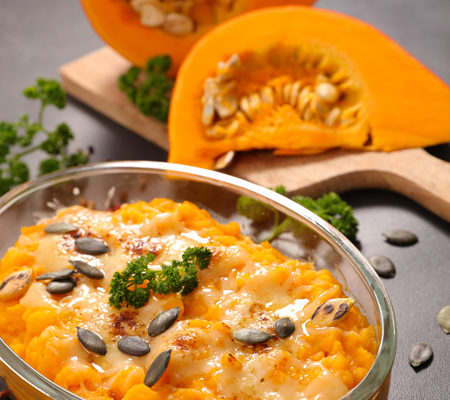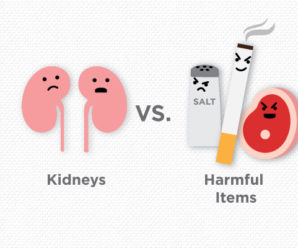
Think of fall or winter, holidays, cheesecake, pancakes, lattes, bread and a common thread through all these thoughts is … pumpkin.
“When you think of pumpkin you may first think of carving,” said Chrisanne Urban, a Marshfield Clinic Health System dietitian. But there’s oh so much more to do with pumpkin and you can almost smell the spices that give it a memorable flavor with your traditional recipes.
Urban suggests taking a good look at hearty, healthful pumpkin and all its possibilities, in season and all year ‘round. This member of the squash family is a traditional favorite and can be used in baking and cooking throughout the year.
Pumpkin’s rich history
There’s a plethora of pumpkins, with this relative of the cucumber grown in six out of seven continents, she said. In the U.S., most pumpkins are grown in Illinois. Early on, they were used to make mats by Native Americans and found to be better to carve by the Irish than turnips.
“When it comes to food, pumpkin can be a very healthy part of your diet,” Urban said. “It’s what we do to the pumpkin that might make it not so good for you.”
Rich in nutrition
Pumpkin packs a nutritional punch. It’s high in potassium, vitamin A and beta carotene, which gives it its orange color. A cup of fresh-cooked pumpkin is 49 calories; 12 grams of carbs; zero fat/protein. But, it’s 200 percent of your daily requirements for vitamin A and 19 percent for vitamin C.
Urban recommends steering clear of canned pumpkin pie mix because of its high sugar content. Use unsweetened canned pumpkin or fresh, “since it’s better that you’re in control of how much sugar you add,” she said. Urban buys unsweetened canned pumpkin for the sugar control but also for convenience.
Raw pumpkin, she added, stays well. Uncut pumpkin can be stored in a cool, dark place for up to two months.
So give pumpkin a try in this high-fiber, low-sodium recipe whenever you’re looking for a nutritious and beautiful side dish, any time of year.
Pumpkin Mashed Potatoes
Time: 35 minutes
Servings: 4 ¾-cup servings
Ingredients
1 pound medium baking potatoes, peeled and quartered
2 cloves garlic, peeled
1 cup canned pumpkin
2 tablespoons reduced-fat cream cheese (Neufchâtel)
1 tablespoon butter or tub-style vegetable oil spread
⅛ teaspoon ground sage
¼ teaspoon salt
¼ teaspoon ground black pepper
¼ cup fat-free milk
Fresh sage leaves
Instructions
In a covered large saucepan, cook potatoes and garlic in enough boiling water to cover for 20-25 minutes or until potatoes are tender; drain. Mash with a potato masher or beat with an electric mixer on low speed until nearly smooth. Beat in canned pumpkin, cream cheese, butter, ground sage, ¼ teaspoon salt and ¼ teaspoon ground black pepper. Gradually add milk, beating until light and fluffy. Return to saucepan; heat through.
Nutrition information
Per serving: 159 calories; 5g fat (3 g sat); 4g fiber; 26g carbohydrates; 4g protein; 27mcg folate; 13mg cholesterol; 4g sugars; 9,716 IU vitamin A; 25mg vitamin C; 62mg calcium; 2mg iron; 206mg sodium; 647mg potassium. Nutrition bonus: Vitamin A (194% daily value), Vitamin C (42% daily value). Carbohydrate servings, 1½. Exchanges, 1½ starch, 1 fat, ½ vegetable.
Source: Eating Well/Diabetic Living Magazine
Print recipe







Leave a Reply